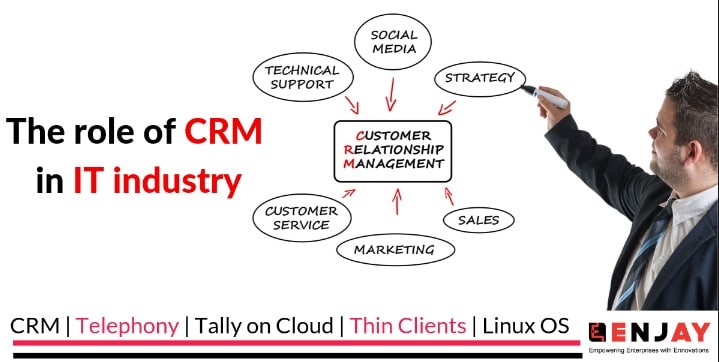In today’s competitive business landscape, where customers hold the reins, nothing is more critical than customer satisfaction. As the old saying goes, “the customer is king,” and indeed they are. But how do companies ensure that they are not only meeting but exceeding customer expectations? This is where Customer Relationship Management (CRM) software steps in, acting as a knight in shining armor.
Maximizing Customer Satisfaction: The Role of CRM Software
Understanding the Basics of CRM
The CRM system is not just a buzzword in the business world; it’s a powerful tool that businesses use to manage and analyze customer interactions and data throughout the customer lifecycle. Aimed at improving business relationships with customers, CRM helps companies stay connected to their customers, streamline processes, and boost profitability.
Why is CRM Important?
Well, the answer is simple. A CRM system helps businesses understand their customers better, allows them to respond quickly to customer needs, and manages customer concerns efficiently. Essentially, it lets you step into your customer’s shoes and see your business from their perspective – an invaluable capability in today’s customer-centric business environment.
Maximizing Customer Satisfaction with CRM
But how exactly does CRM contribute to maximizing customer satisfaction? Let’s delve into it.
- Personalized Customer Service
The CRM system allows businesses to treat each customer as an individual rather than a part of the crowd. By storing detailed customer information, CRM helps businesses personalize their offerings and tailor their services to match the specific needs and preferences of each customer.
- Streamlined Communication
CRM ensures that every interaction with the customer is not a disjointed one. It allows businesses to ensure consistent communication across various customer touchpoints, making customers feel valued and understood.
- Efficient Issue Resolution
CRM provides businesses with the tools to respond promptly to customer issues or complaints. Quick response and efficient problem-solving can significantly enhance customer satisfaction.
Choosing the Right CRM Software
Not all CRM software is created equal. To maximize customer satisfaction, businesses must select the CRM system that best suits their needs. When choosing a CRM system, consider its ease of use, scalability, integration capabilities, and the quality of customer support provided by the software vendor.
Maximizing the Potential of Your CRM
Merely implementing a CRM system is not enough. Companies must also effectively use their CRM to reap its benefits fully. This can be achieved by ensuring accurate data input, utilizing its analytics capabilities, integrating it with other business systems, and conducting regular training for employees on how to use the CRM system effectively.
Understanding the Limitations of CRM
While CRM has numerous benefits, it’s not a magic bullet for customer satisfaction. Businesses must also focus on other aspects like product quality, pricing, and employee-customer interaction to deliver a holistic and satisfying customer experience.
The Future of CRM
With advancements in AI and machine learning, the future of CRM looks promising. Future CRM systems are expected to predict customer behavior more accurately, automate routine tasks, and provide more personalized customer experiences.
Frequently Asked Questions
1. What is CRM software?
Customer Relationship Management (CRM) software is a tool that helps businesses manage and analyze customer interactions and data throughout the customer lifecycle. It’s designed to improve business relationships, increase customer satisfaction, and enhance profitability.
2. How does CRM software maximize customer satisfaction?
CRM software maximizes customer satisfaction by personalizing customer service, streamlining communication, and ensuring efficient issue resolution. It helps businesses treat each customer as an individual, providing tailored services based on specific needs and preferences.
3. What factors should I consider when choosing CRM software?
When choosing CRM software, you should consider its ease of use, scalability, integration capabilities, and the quality of customer support offered by the software vendor. It’s also important to consider the specific needs of your business and your budget.
4. Can CRM software predict customer behavior?
With advancements in AI and machine learning, modern CRM systems are capable of predicting customer behavior to a certain extent. They can analyze past customer data and identify patterns, which can then be used to predict future behavior.
5. Is CRM software enough to ensure customer satisfaction?
While CRM software plays a crucial role in enhancing customer satisfaction, it’s not the only factor. Other aspects, such as product quality, pricing, and employee-customer interaction, also contribute significantly to the customer experience.
6. What’s the future of CRM?
The future of CRM looks promising, with advancements in AI and machine learning. Future CRM systems are expected to offer more accurate customer behavior predictions, more personalized customer experiences, and improved automation of routine tasks.
Maximizing customer satisfaction is no easy feat, but with the right CRM software and a customer-centric approach, businesses can ensure they’re hitting the mark. Remember, a satisfied customer is not only loyal but also an advocate for your brand. Embrace CRM software and unlock your business’s full potential.
Conclusion
In the race to win customers’ hearts, businesses can’t afford to underestimate the power of CRM software. By personalizing customer experiences, ensuring efficient communication, and resolving issues promptly, CRM plays a pivotal role in maximizing customer satisfaction. It’s a crucial companion for any business that wishes to thrive in the contemporary customer-focused landscape.
Read More :
- Unlocking Customer Success: The Power of CRM Software
- Empowering Insights: The Role of Business Intelligence Tools in Modern Businesses
- Supercharge Your Business : Embrace the Power of Business Intelligence Tools
- From Raw Data to Actionable Insights: Leveraging Business Intelligence Platforms
- Unleash Your Data Potential: The Magic of Business Intelligence Platforms

